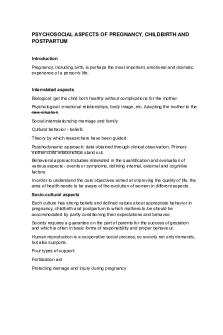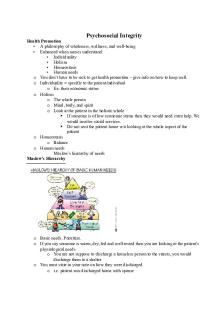Psychosocial Development PDF

| Title | Psychosocial Development |
|---|---|
| Author | Jay Foster |
| Course | Child & Adolescent Development |
| Institution | The University of Arizona Global Campus |
| Pages | 5 |
| File Size | 113.1 KB |
| File Type | |
| Total Downloads | 64 |
| Total Views | 147 |
Summary
Psychosocial Development, Week 4...
Description
Running head: PSYCHOSOCIAL
1
Psychosocial Development Brijay Foster PSY 104 Dr. Holly Johnson 12.18.2018
PSYCHOSOCIAL
2 Psychosocial Development
Erik Erikson, a Danish psychoanalyst determined that social interaction was fundamental in the development of one’s personality. Erikson is known for his highly regarded Psychosocial Crisis Model. According to Mr. Erikson, there are eight stages of psychosocial development. During each stage of psychosocial development, there is potential for that stage to be mastered with the help of positive socialization or the opportunity of crisis due to negative social interactions and experiences. The implementation of psychosocial activities from infancy through adolescence ensure that a child grows into an autonomous, well-rounded adult. Infancy. The development of social skills is an integral part of developing a personality. Although the infant is not able to verbalize their complex emotions and thoughts, there are activities that assist in developing the skills needed for communication. The infant is completely dependent upon the caregiver if the child’s needs are being met, the child develops a sense of trust. “In contrast, an insecure infant (perhaps one who has been neglected) will develop a sense of mistrust. Therefore, the first of Erikson's stages are referred to as basic trust versus mistrust” (Mossler, 2014). One activity that will assist in the psychosocial development of trust during infancy is conversing. When the caregiver asserts their full attention on the baby, the infant will then feel trust. Early Childhood. As the child advances to toddlerhood, he begins to discover his autonomy. During the period of early childhood, the child begins to see themselves as an individual as they play with children their age. At this age, the child’s life expands rapidly. This newly founded autonomy and curiosity pushes the child to take initiative by trying aspects of life by themselves.
PSYCHOSOCIAL
3
“…children who are rushed begin to doubt themselves because of a perceived lack of competence. This conflict is known as autonomy versus shame and doubt” (Mossler, 2014). The play is a key element in the growth of their psychosocial skills. Duck, Duck, Goose is an entertaining way to help develop a child’s psychosocial skills. This game forces the ego-centric child to comply to his peers and wait to be picked, to promptly begin to run around the circle. This game is great for psychosocial development because it teaches the child to autonomously play in a large group, follow rules and communicate non-verbally. Adolescence. As an adolescent, identity is very important to psychosocial development. The teenager begins to grow concern or curiosity as to how the world and more importantly, their peers, view them. The teenager is often faced with the internal conflict of desiring to stand out, coupled with the need to be accepted. “Beginning in early adolescence, physical, sexual, and cognitive changes, as well as more complex social demands, contribute to confusion about identity. Erikson called this time of potential upheaval the adolescent identity crisis” (Mossler, 2014). At this stage of development, the teen is trying on different roles, or images in hopes of establishing a sense of self. Adolescence can explore their identity through an internship. The community center will partner up with local businesses in diverse fields to provide teens the opportunity to explore their interests. Interning will empower students to explore potential career opportunities and interests while establishing a strong sense of identity. Strong social interaction is imperative for healthy ego development. Ignoring the elements of Erikson’s psychosocial stage theory will cause a deficit in key self-sufficiency. Critics have questioned the validity of how Erikson categorized each stage based on age, however, it is obvious that these stages happen in one form or another throughout one’s lifetime.
PSYCHOSOCIAL Implementing Erikson’s psychosocial stage theory will assist the infant to reach selfactualization as they mature into elderhood.
4
PSYCHOSOCIAL
5 References
Mossler, R. A. (2014). Child and adolescent development (2nd ed). Retrieved from https://content.ashford.edu/...
Similar Free PDFs

Psychosocial Development
- 5 Pages

Psychosocial Integrity chapt
- 19 Pages

Psychosocial Aspects OF Pregnancy
- 19 Pages

Foundations - Psychosocial Integrity
- 12 Pages

Chapter 2 Psychosocial Health
- 12 Pages
Popular Institutions
- Tinajero National High School - Annex
- Politeknik Caltex Riau
- Yokohama City University
- SGT University
- University of Al-Qadisiyah
- Divine Word College of Vigan
- Techniek College Rotterdam
- Universidade de Santiago
- Universiti Teknologi MARA Cawangan Johor Kampus Pasir Gudang
- Poltekkes Kemenkes Yogyakarta
- Baguio City National High School
- Colegio san marcos
- preparatoria uno
- Centro de Bachillerato Tecnológico Industrial y de Servicios No. 107
- Dalian Maritime University
- Quang Trung Secondary School
- Colegio Tecnológico en Informática
- Corporación Regional de Educación Superior
- Grupo CEDVA
- Dar Al Uloom University
- Centro de Estudios Preuniversitarios de la Universidad Nacional de Ingeniería
- 上智大学
- Aakash International School, Nuna Majara
- San Felipe Neri Catholic School
- Kang Chiao International School - New Taipei City
- Misamis Occidental National High School
- Institución Educativa Escuela Normal Juan Ladrilleros
- Kolehiyo ng Pantukan
- Batanes State College
- Instituto Continental
- Sekolah Menengah Kejuruan Kesehatan Kaltara (Tarakan)
- Colegio de La Inmaculada Concepcion - Cebu










